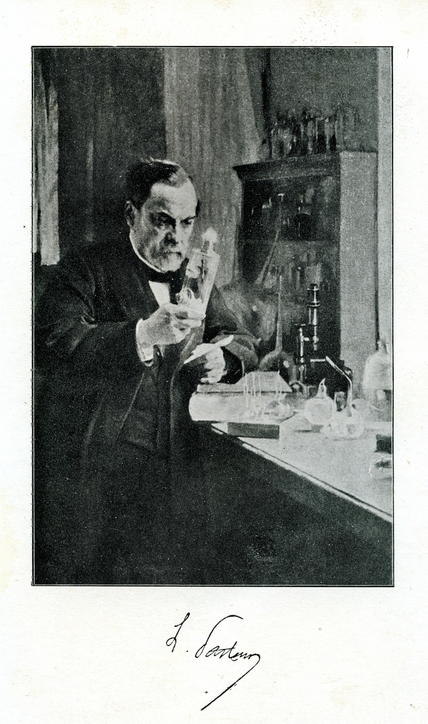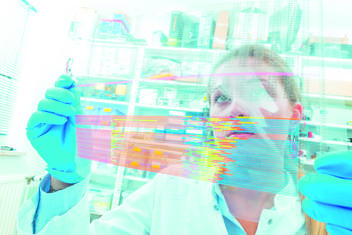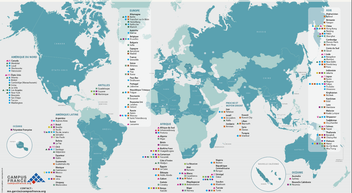The excellence of French research can be seen not only in the reputation of its university institutes, but also in its researchers. For decades, French researchers have been recognised around the world and even received awards for their work.
A few leading French researchers
Trained in the French Grandes Ecoles and universities, many French researchers, in all academic fields, have been recognised around the world for their work. Regardless of your area of expertise, whether it is in the Humanities or the "exact" Sciences, you will find a French reference in your reading list.
A few of the profiles presented here may inspire you; this list is not, of course, exhaustive. To rub shoulders with many more, come do your doctorate in France[Ap2] .
[Ap2]Lien vers : Chercheurs > Doctorat > Comment fonctionne le doctorat en France ?
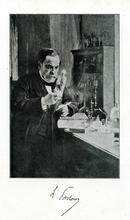
Louis Pasteur (1822-1895), physicist and chemist
A chemist and physicist by training, Louis Pasteur was behind the 19th century's biggest advances in chemistry and medicine, in particular in the fight against infectious diseases. Considered the inventor of bacteriology and microbiology, he patented pasteurisation in 1865 and developed the rabies vaccine in 1885. The Pasteur Institute that he directed until his death in 1895 is today considered one of the world's leading research centres for studying micro-organisms and infectious diseases.
Marie Curie (1867-1934), physicist and chemist
Marie Sklodowska-Curie was the first woman to be awarded a Nobel Prize, and the only person to receive a Nobel in two different scientific fields. In 1903, she and her husband were awarded the Nobel Prize in Physics for their work on radiation, and in 1911, her discovery of radium and polonium earned her the Nobel Prize in Chemistry. The Paris university specialising in science and medicine today bears her and her husband's names: Université Pierre et Marie Curie (UPMC). Her name has also been given to the biggest European researcher exchange programme.
Hélène Metzger (1889-1944), epistemologist
A crystallographer by training, Hélène Metzger devoted herself to studying the history of science. She published numerous articles and monographs in epistemology journals between 1920 and 1940. She spent a considerable amount of time working on the history of French chemistry, and placed scientists and the context of their research at the heart of the history of science. She was an administrator of the International Committee of Historical Sciences, but did not achieve recognition in the French university system, and so remained an amateur. Her arrest by the Germans in 1944 interrupted her career; she would not return from Auschwitz.
Claude Lévi-Strauss (1908-2009), ethnologist
A renowned anthropologist and ethnologist, Claude Lévi-Strauss revolutionised anthropology by inventing the concept of structuralism, which had a profound influence on contemporary thought, not just in ethnology, but also in sociology, philosophy, history and literature. Recipient of the CNRS gold medal in 1967, he also received honorary doctorates from a number of universities around the world and was a foreign member of the National Academy of Sciences of the United States of America. One of his most widely read works, Tristes Tropiques, published in 1955, is a mixture of a travelogue and philosophical reflections.
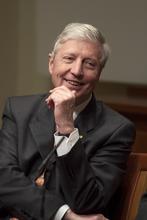
Jules Hoffman (1941-), biologist
The biologist Jules Hoffmann is a professor at the Institute of Advanced Studies at the University of Strasbourg, and a research director at the CNRS. He was awarded the Nobel Prize in Medicine in 2011 for his research on innate immunity. His work has led to major advances in the field of prevention and therapy for cancer, infections and inflammatory diseases. He is member of many prestigious institutes, including the the Académie française since 2012.
Katia Krafft (1942-1991), volcanologist
Katia Krafft studied physics and geochemistry at the University of Strasbourg, and quickly turned to volcanology. She and her husband, Maurice Krafft, also a volcanologist, travelled around the world. They were nicknamed the volcano devils by their peers as they hopped from the slopes of one erupting volcano to another, never missing one – they filmed them and took photographs, recording 175 eruptions in 25 years. Katia Krafft died alongside her husband, swept away by a pyroclastic flow on Mount Unzen in Japan in 1991. Their work is still referenced today in France and abroad.
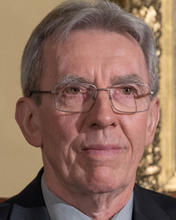
Jean-Pierre Sauvage (1944-), chemist
A specialist in the coordination chemistry, Jean-Pierre Sauvage worked at the CNRS from 1971 to 2014. He wrote his doctorate under the supervision of Jean-Marie Lehn, who won the Nobel Prize in Chemistry in 1987, and Sauvage was himself the recipient of the Nobel in 2016 for his work on the design and synthesis of molecular machines. He is a permanent member of the Academy of Sciences and professor at the University of Strasbourg.
Monique Pinçon-Charlot (1946-), sociologist
Monique Pinçon-Charlot is a research director at the CNRS and attached to the Institute of Research into Contemporary Societies (IRESCO) at the University of Paris-VIII. She generally works with Michel Pinçon, her husband, who is also a sociologist and researcher at the CNRS. Most of their work is the result of shared effort. Their speciality is the study of elite and upper social classes, and they study, among other things, homogamy, insularity and social norms. She retired in 2007, but is continuing her work. She is a member of the French Communist Party.
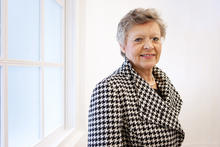
Françoise Barré-Sinoussi (1947-), virologist
A specialist in virology, Françoise Barré-Sinoussi worked at the Pasteur Institute and the American National Science Foundation before joining INSERM in 1975. As part of Luc Montagnier's team, in 1983 she discovered the AIDS virus (HIV-1), and was awarded the Nobel Prize in Medicine in 2008 in recognition. At the Pasteur Institute, she then directed first the retrovirus biology laboratory, then the Regulation of Retroviral Infections Division. In 2008, she oriented her research towards the congenital regulation of infections by HIV. In 2012, she is president of the International AIDS Society, the leading independent international society of researchers and doctors against HIV/AIDS and in November 2017, she became President of the Sidaction, an association dedicated to the fight againt cancer.
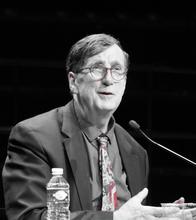
Bruno Latour (1947-), anthropologist
A philosopher and anthropologist, Bruno Latour studies how research functions and researchers’ daily lives. He is considered a sociologist of science and has earned a glittering reputation, especially in the English-speaking world. He conducts his research and teaches in engineering schools in France and abroad. Since 2006, he has been a professor at the Institute of Political Studies in Paris, where he has created a number of programmes: the medialab, the SPEAP (Sciences-Po Programme d'Expérimentation en arts et politique - Political Science Experimental Programme in Arts and Politics) and the FORRCAST, a programme for teaching by mapping controversies.
Nonna Mayer (1948-), political scientist
A Doctor of Political Science, Nonna Mayer is a research director at the CNRS, attached to the Centre for Political Science Research (CEVIPOF). She teaches at the Institute of Political Studies in Paris. She has extensively studied electoral sociology, in particular on the extreme right, and co-directs a work group on the French National Front with Pascal Perrineau. She also works on militancy, racism and antisemitism.
Catherine Wihtol de Wenden (1950-), political scientist
A research director at the CNRS (CERI) and with a PhD in political science, she is a specialist in international migration. She has conducted numerous field studies and directed different comparative research studies, especially European. Catherine Wihtol de Wenden is a consultant for the OECD, the Council of Europe and the European Commission, in addition to being an external expert for the United Nations High Commission for Refugees (UNHCR).
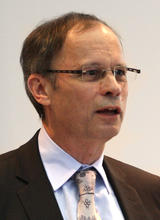
Bruno Latour (1947-), anthropologist
A philosopher and anthropologist, Bruno Latour studies how research functions and researchers’ daily lives. He is considered a sociologist of science and has earned a glittering reputation, especially in the English-speaking world. He conducts his research and teaches in engineering schools in France and abroad. Since 2006, he has been a professor at the Institute of Political Studies in Paris, where he has created a number of programmes: the medialab, the SPEAP (Sciences-Po Programme d'Expérimentation en arts et politique - Political Science Experimental Programme in Arts and Politics) and the FORRCAST, a programme for teaching by mapping controversies.
Nonna Mayer (1948-), political scientist
A Doctor of Political Science, Nonna Mayer is a research director at the CNRS, attached to the Centre for Political Science Research (CEVIPOF). She teaches at the Institute of Political Studies in Paris. She has extensively studied electoral sociology, in particular on the extreme right, and co-directs a work group on the French National Front with Pascal Perrineau. She also works on militancy, racism and antisemitism.
Catherine Wihtol de Wenden (1950-), political scientist
A research director at the CNRS (CERI) and with a PhD in political science, she is a specialist in international migration. She has conducted numerous field studies and directed different comparative research studies, especially European. Catherine Wihtol de Wenden is a consultant for the OECD, the Council of Europe and the European Commission, in addition to being an external expert for the United Nations High Commission for Refugees (UNHCR).

Cédric Villani (1973-), mathematician
Cédric Villani is mainly interested in kinetic theory and optimal transport and its applications. He graduated from the École Normale Supérieure (ENS) and wrote his thesis on the mathematical theory of Boltzmann's equation. He is a Director of the Henri Poincaré Institute and Professor at the University Claude Bernard in Lyon. He was awarded the Fields medal in 2010. He has been a representative in the National Assembly for the movement "La République En Marche!" since the legislative elections in June 2017.
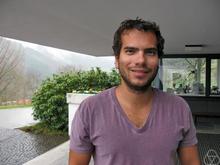
Artur Avila (1979-), mathematician
Artur Avila is a Franco-Brazilian mathematician working primarily on dynamic systems in spectral theory. He did his post-doctorate in France in 2001 at the Collège de France. In 2008, at the age of 29, he became the youngest director of research at the CNRS. He was awarded the Fields medal in 2014.


















































